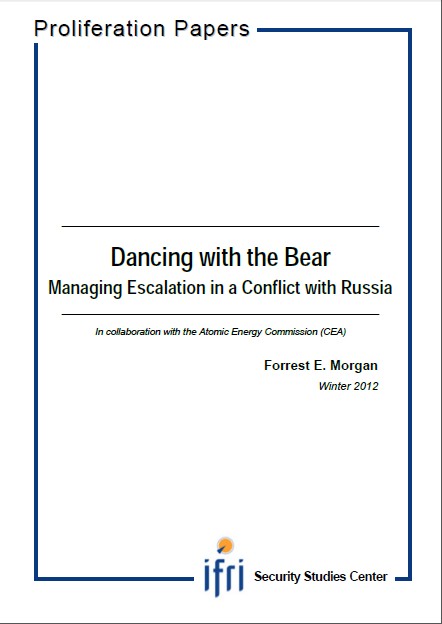Dancing with the Bear: Managing Escalation in a Conflict with Russia

"Escalation", the tendency of belligerents to increase the force or breadth of their attacks to gain advantage or avoid defeat, is not a new phenomenon. Systematic thought about how to manage it, however, did not crystallize until the Cold War and the invention of nuclear weapons.
Given the limitations identified in these Cold War approaches to escalation and the profound changes that have affected the strategic environment, a new framework for thinking and managing escalation against nuclear adversaries is needed. It should lead to a deeper understanding of the phenomenon of escalation: its dynamics, forms, and the motives that drive it. This paper attempts to fill a gap in the current strategic literature, and explores the challenges that NATO would face in managing escalation in a military conflict with a major nuclear power such as the Russian Federation. Escalation management is about keeping wars limited. In a war against Russia, Western leaders would need to weigh their interests in the issue at stake and adjust their war aims and efforts accordingly. They could secure success only if it is defined and pursued in ways that ultimately allow for compromise and do not threaten the survival of the Russian state or its leaders.

Available in:
Regions and themes
ISBN / ISSN
Share
Download the full analysis
This page contains only a summary of our work. If you would like to have access to all the information from our research on the subject, you can download the full version in PDF format.
Dancing with the Bear: Managing Escalation in a Conflict with Russia
Related centers and programs
Discover our other research centers and programsFind out more
Discover all our analysesThe Franco-German Brigade and the Revival of European Defense
One thing has been clear since Donald Trump's return to the White House: the very existence of the European unification project is threatened. Unless it develops a sovereign defense policy to counter the war in Ukraine and the weakening of American security guarantees, the European Union will continue to see its internal cohesion and external attractiveness wane.
Taking the Pulse: Can Europeans Build Their Independent Extended Nuclear Deterrent?
Confronted with a U.S. disengagement and the Russian threat, Europeans are reconsidering their stance on nuclear deterrence. Given the capabilities of the French and British arsenals, can Europe develop an independent nuclear deterrent?

RAMSES 2024. A World to Be Remade
For its 42nd edition, RAMSES 2024 identifies three major challenges for 2024.
A Transatlantic Defense Industrial Base? Two Contrasting Views
The evolving landscape of global defense cooperation has brought the transatlantic relationship between the United States (US) and Europe into sharp focus. As geopolitical tensions rise and the threat environment becomes more complex, the question of how Europe can best ensure its security while navigating its relationship with the United States has become paramount. This double feature report offers two contrasting views on the dynamics of US-Europe defense industrial relations, highlighting the challenges and opportunities that lie ahead for both parties.







